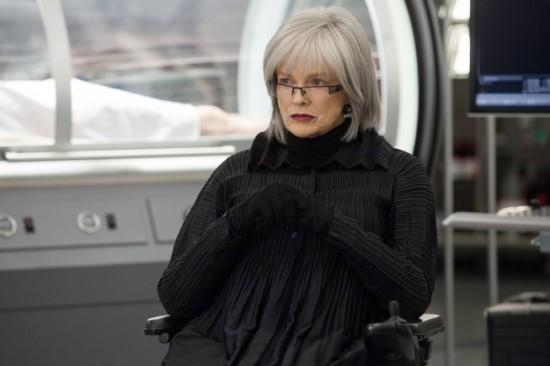Contributor: John Keegan
Written by David Fury
Directed by Jeffrey Hunt
If there has been one major casualty of this shortened fifth and final season, it has been the inability of the writers to delve into the details of what the supporting characters have been doing all this time. Previous seasons have allowed the depth and scope to explore various subplots for a multitude of characters, but the rush to the endgame (along with the radical shift in the setting) has forced the focus to be on the main characters, almost exclusively.

The end result is that key supporting characters, like Nina and Broyles, have been sidelined for much of the fifth season run. Considering that the season (and series) is barreling towards the big finish, and there’s still a great deal of ground to cover to make it all come together well, it might have made sense to leave well enough alone. We knew that Nina was serving her purpose behind the scenes in the Ministry of Science, and Broyles has been shown to be a resistance mole within human law enforcement. It would have been unfortunate to leave it there, untouched, but at least their function within the story would have been addressed.
Instead, the writers deliver this episode, a powerful vehicle for Blair Brown and a solid, heroic ending for Nina. It makes sense that someone inherently involved in the development of technology that, directly or indirectly, led to the abuses of the Observers should have to sacrifice herself to end their Occupation. Doing so in service to protection, and even exploration, of the role of the “child” Observer makes the sacrifice meaningful.
I have no complaint for those developments themselves; within the context of the episode, it’s a stirring and emotional sendoff. What is more problematic is previous lack of development for Nina and her role in the resistance. Much of it is implied in this episode, and it’s enough to set the stage and make it clear what Nina’s choices represent. To some extent, however, the lack of setup in previous episodes makes it all seem rushed.
It’s not as though Nina hasn’t been present at all; she’s been around to discuss Walter’s mental state. She was there to represent Walter’s hope of absolution from the man he had once been, and could be again. So why not use that time to emphasize the increasing danger of detection? Perhaps there was mention of it, here and there, but not enough to drive it home and form the foundation for the events of this episode.
The context of the resolution for Nina’s character arc is emblematic of the concerns regarding the rest of the season. There’s just so much to cover in the final three episodes: the final battle against the Observers, Donald/September, the “child”, Etta’s role as catalyst for the resistance, and even Broyles’ final contribution. It’s possible that each item, in isolation, will get as strong a resolution as Nina received, but will the whole be greater than the sum of those parts? For “Fringe” to end well, I think it must.
This season has already brought the series full circle in many ways. I’ve already discussed the thematic and structural aspects of this in recent reviews, but this episode in particular reminded me that “Fringe” began as a refined, improved take on “The X-Files” mythology. Instead of referencing a future apocalyptic event and alluding to unusual children being the “key to everything”, the writers have actually delivered and made sense of all those elements within the mythology. They just have to stick the landing, and for better or worse, it feels like they might need to cover too much ground, too quickly, to avoid a stumble.
Writing: 2/2
Acting: 2/2
Direction: 2/2
Style: 2/4
Final Score: 8/10

